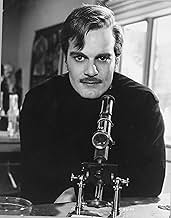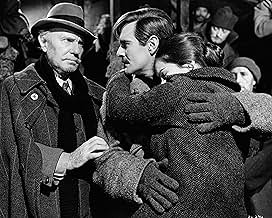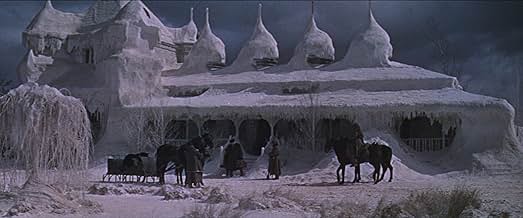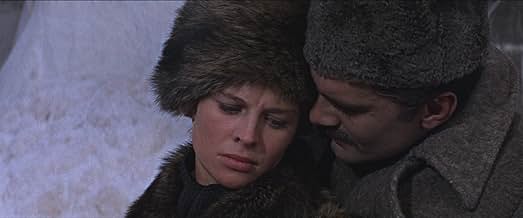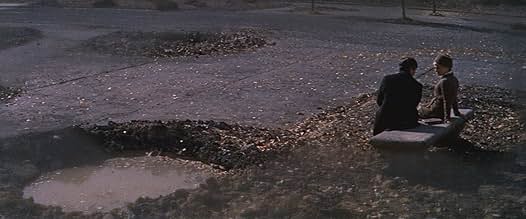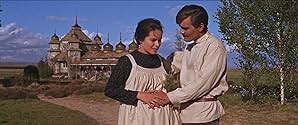एक रूसी चिकित्सक और कवि का जीवन, जो हालांकि दूसरे से शादी करता है, एक राजनीतिक कार्यकर्ता की पत्नी के साथ प्यार में पड़ जाता है।एक रूसी चिकित्सक और कवि का जीवन, जो हालांकि दूसरे से शादी करता है, एक राजनीतिक कार्यकर्ता की पत्नी के साथ प्यार में पड़ जाता है।एक रूसी चिकित्सक और कवि का जीवन, जो हालांकि दूसरे से शादी करता है, एक राजनीतिक कार्यकर्ता की पत्नी के साथ प्यार में पड़ जाता है।
- 5 ऑस्कर जीते
- 21 जीत और कुल 13 नामांकन
- Liberius
- (as Gerard Tichy)
सारांश
फ़ीचर्ड समीक्षाएं
The film is a sweeping saga of several people during the period of the Russian Revolution--both before and after. I could summarize the film but considering that there are already over 200 reviews, I'll spare you. At three hours and twenty minutes, oddly, not a lot seemed to occur in the film. I am not complaining or saying it was dull, as it was a lovely film--with very nice cinematography and music. It's just that the film is the type that slowly and deliberately unfolds--and the more hyperactive might not find that to their liking. The acting is quite nice but I think the real star is the direction. My only reservation is that with the great romance between Zhivago (Omar Sharif) and Lara (Julie Christie)--they both were married and Zhivago's wife (Geraldine Chaplin) was a lovely person. This did make it difficult for me to care about the characters more. Still, it's a lovely spectacle and well worth your time.
As materialists (matter precedes spirit, not vice versa), the Bolsheviks believed that they had found the holy grail of human progress in Marxism-Leninism, and were now able to assume the reins of history in their own hands. They believed that their violence was not only justified, but necessary, oblivious to the fact that they, too, somehow felt the angel of medieval teleology smiling over their shoulders.
In contrast to the Bolsheviks, Zhivago's ethos, if he had one, was almost identical to Kant's `categorical imperative,' which had just one axiom: treat people as ends in themselves, and not as ends to a mean. There couldn't be a sharper moral contrast.
There's a fabulous scene midway through the movie that highlights the difference in moral attitude. Dr. Zhivago confronts a communist functionary who has ordered the destruction of a village, a hamlet suspected of aiding the Mensheviks by selling them horses. To the Bolsheviks, if you weren't 100 percent behind them, you were a `counterrevolutionary,' sorta like Dubya's idea that you're either for us, or against us. And so Strelnikov, the passionate Bolshevik, glibly justifies his actions to Dr. Zhivago as easy as if he were tossing his hair aside, saying that the annihilation of the village, however cruel, is necessary to make a point. Zhivago replies: `Your point; their village.'
I love this film, a timeless epic. If there's a more beautiful heroine in all of movie-making history than Julie Christie (Lara), I'm not aware of it. And Omar Sharif is stunning as Iuri Zhivago, who heals the body with emetics, scalpels, antiseptic, and gauze, while he heals the soul with his poetry. Although the movie is three hours and 20 minutes long, the cinematography is so efficient, evocative, and densely layered that one hardly notices. This is, in my opinion, one of the best films of all time.
"Doctor Zhivago" is definitely one of his most outstanding works, a film that breathes with life, and suffers with passion. Neither, though, of the credited people can take as much credit for it, as David Lean. Omar Sharif delivers one of his best performances of his career, Julie Christie has never been as stunning, or Rod Steiger as Komarovsky or Tom Courtenay as Antipov ever left more memorable performances than these ones. Not even Maurice Jarre, who composed one of the most unforgettable themes in film history, or Robert Bolt, for his skillful adaptation on Pasternak's difficult novel, not even Freddy Young's cinematography, can rise above the vibration of genius, which is David Lean. We almost feel the complexity of the universe collapsing on us with a mad power that we instantly become part of it, and fall in love with all its particles.
For those who haven't seen the film, this might make little sense, and it can give a misleading understanding of what one is to expect. "Doctor Zhivago" is a poet, who at the beginning of the 20th Century is caught in the historical Bolshevik revolution. An outstanding doctor, married to his childhood friend, Tonya (Geraldine Chaplin in a warm performance), finds that there is beauty beyond deceit, love beyond commitment, by starting an affair with an enigmatic lady which appears often in his path in the most unnoticeable of moments. Their destiny is as confused as Russia in the turmoil started by the Reds, it is shaped by history without their approval. There is no solution for a country that abandoned its passions in its desire of self-improvement, just as for the two lovers, which find themselves abandoned in the middle of the Siberian taiga.
This is a slow film and for the good reasons. We are allowed to breathe the story, to give it momentum, and to judge it from within, as if the choices were not Yury's, Lara's or Tonya's, but our own creation. And this is the brilliance of Lean's direction. The story transcends time and space, and it melts within the triviality of our life. Beyond it, we are left with nothing but love, pure and blindingly real.
क्या आपको पता है
- ट्रिवियाThis movie wasn't shown in Russia until 1994.
- गूफ़The little girl who plays Tonya at Yuri's mother's funeral starts to cross herself in the Roman Catholic manner, but quickly corrects herself and finishes in the Russian Orthodox style.
- भाव
Komarovski: Lara, I am determined to save you from a dreadful error. There are two kinds of men, and only two, and that young man is one kind. He is high-minded. He is pure. He is the kind of man that the world pretends to look up to and in fact despises. He is the kind of man who breeds unhappiness; particularly in women. Now, do you understand?
Lara: No.
Komarovski: I think you do. There's another kind. Not high-minded. Not pure. But alive. Now that your taste at this time should incline towards the juvenile is understandable. But for you to marry that boy would be a disaster. Because there's two kinds of women...
[Lara covers her ears, he forces her arms down]
Komarovski: There are two kinds of women and you - as we well know - are not the first kind.
[Lara slaps him, he slaps her back]
Komarovski: You, my dear, are a slut.
Lara: I am not!
Komarovski: We'll see.
- इसके अलावा अन्य वर्जनWhen it was first released, the film originally ran 197 minutes. Early in its run, David Lean and editor Norman Savage shortened it to 180 minutes; this version was in circulation for years. By the mid-1990s, the uncut version was restored.
- कनेक्शनEdited into Hollywood: The Dream Factory (1972)
टॉप पसंद
विवरण
- रिलीज़ की तारीख़
- कंट्री ऑफ़ ओरिजिन
- आधिकारिक साइट
- भाषाएं
- इस रूप में भी जाना जाता है
- Doktor Živago
- फ़िल्माने की जगहें
- Morley Flats, अल्बर्टा, कनाडा(Frozen house longshots)
- उत्पादन कंपनियां
- IMDbPro पर और कंपनी क्रेडिट देखें
बॉक्स ऑफ़िस
- बजट
- $1,10,00,000(अनुमानित)
- US और कनाडा में सकल
- $11,17,21,910
- दुनिया भर में सकल
- $11,20,90,394
- चलने की अवधि3 घंटे 17 मिनट
- रंग
- पक्ष अनुपात
- 2.35 : 1
इस पेज में योगदान दें








